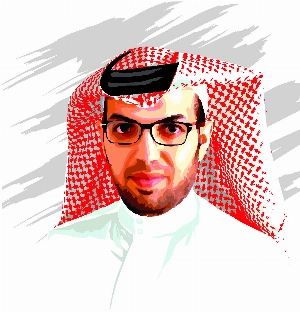Since the coming to power of Custodian of the Two Holy Mosques King Salman and the emergence of Crown Prince Muhammad Bin Salman on the political scene, we are witnessing a new stage, or rather, a new version of the country with attributes of power and dynamism at all levels.
His vision for the management of state affairs during the next phase of the country’s history can be seen by anyone who refers to the content of King Salman’s speech in March 2015 at Al-Yamama Palace in Riyadh. Every paragraph in the speech consolidates foundations of a civil state and promotes values of citizenship through the achievement of social justice and equality, elimination of corruption, enhancement of security, development and welfare. Hence, what we see now is a practical application of King Salman’s ambitious vision, which was translated to Saudi Vision 2030 announced by its mastermind, Crown Prince Muhammad Bin Salman.
The current anti-corruption drive, represented by the recent royal decree to form a new anti-corruption committee with full power, led by the Crown Prince, is directed at ensuring the realization of Saudi Vision 2030. None of the ambitious projects of Vision 2030, including the National Transformation Program, Fiscal Balance Program and the Public Investment Fund, can be realized unless accompanied by genuine anti-corruption efforts. Without such efforts many of these projects may end up being delayed or hampered by either administrative or financial corruption. According to Nazaha, the National Anti-corruption Commission, 44 percent of government projects are behind schedule. Therefore, the decree contributes to the raising of efficiency and quality of work in accordance with the highest standards through the perfect investment of the available resources without the squandering or abuse of public money.
Moreover, Vision 2030 is aimed at attracting national investment, encouraging the inflow of foreign capital to the Kingdom and transforming the Saudi investment environment into a healthy one that is globally competitive and attractive. This cannot be achieved without reconsidering the anti-corruption mechanism and verifying that it is not an impediment to internal or external investment.
“I am more supportive of Saudi investments today than I was a week ago or a year ago,” said Sam Zell, Chairman at Equity Group Investments, when asked about the recent developments in Saudi Arabia in an interview with Bloomberg. Such a decisive decree will gain the confidence of local and international investors in the Saudi partnership with heavyweight companies, who will invest in the upcoming large-scale projects including the NEOM project, the Qiddiya project and the Red Sea project, as well as in other fields of technology, military industry and petroleum. The success of these projects requires a transparent and corruption-free investment environment.
Furthermore, many cases of corruption are linked to money laundering, which could threaten the security and stability of the state and its financial system. It is well known that Saudi Arabia is keen to combat this crime through cooperation with the relevant regional and international organizations forefronted by the Financial Action Task Force (FATF), Middle East and North Africa Financial Action Task Force (MENAFATF) and the Egmont Group of Financial Intelligence Units. This led FATF to grant Saudi Arabia an observer seat in 2015. Seeking to win a permanent seat in FATF, Saudi Arabia has started preparations for the third assessment scheduled to take place in June 2018.
In addition, Vision 2030 seeks to enhance the international reputation of Saudi Arabia. According to the Corruption Perception Index (CPI) of 2016 issued by Transparency International, Saudi Arabia is ranked 62nd of 176 countries. This is a very low rank that neither reflects the natural position of the Kingdom nor suits the largest Arab economy.
Finally, the decree is a quantum leap in transparency and accountability, which contributes to the consolidation of citizenship and the foundations of a civil state in order to achieve development and welfare.
— Dr. Ibrahim Al-Othaimin is a Middle East affairs specialist and security analyst based in Riyadh. He can be contacted at
Ibrahim.othaimin@gmail.com. Follow him on Twitter
@Alothaimin
